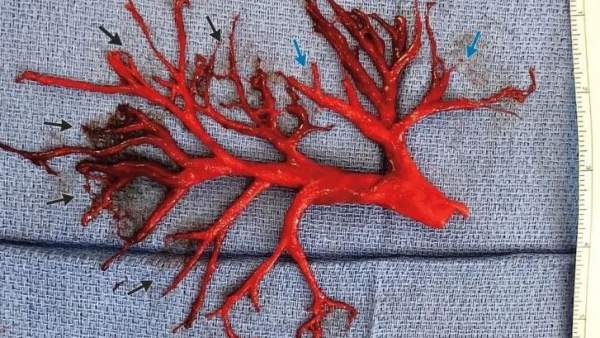

Nakamura H, Fujinaka T, Tasaki O, Yoshimine T. A systematic review of the relationship between blood loss and clinical signs. Pacagnella RC, Souza JP, Durocher J, et al. THREAT helps to identify epistaxis patients requiring blood transfusions. Murer K, Ahmad N, Roth BA, Holzmann D, Soyka MB. Current approaches to epistaxis treatment in primary and secondary care. See your doctor for treatment early on to help prevent complications or worsening of symptoms later.Beck R, Sorge M, Schneider A, Dietz A. Coughing up yellow or green sputum may be a sign of a respiratory infection.

In some cases, treatment can also involve reducing inflammation or other related symptoms.

Treating blood-tinged sputum will require treating the underlying condition that’s causing it. During a biopsy, a sample of tissue is removed from your lungs and sent to a lab for evaluation. If your doctor notices a structural abnormality in your lungs, they may order a biopsy.They can order blood tests to diagnose different conditions, as well as determine how thin your blood is and check to see if you’ve lost so much blood that you’ve developed anemia.This instrument helps them check for obstructions or abnormalities in your airways. During a bronchoscopy, your doctor lowers a bronchoscope down the back of the throat and into the bronchi.

A CT scan of the chest can provide a clearer image of soft tissues for evaluation.A chest X-ray is often one of the first imaging studies they order. Chest X-rays can be used to diagnose a variety of different conditions.Your doctor may also use one or more imaging studies or procedures to help them reach a diagnosis. They’ll also ask about your medical history. Your doctor will listen to your lungs while you breathe and may look for other concerning symptoms, like a rapid heart rate, wheezing, or crackles. how many times you cough it up during the day.how long you’ve had blood-tinged sputum.When you see a doctor about the blood-tinged sputum, they’ll first ask you if there was any noticeable cause, like: Diagnosing the cause of blood-tinged sputum


 0 kommentar(er)
0 kommentar(er)
